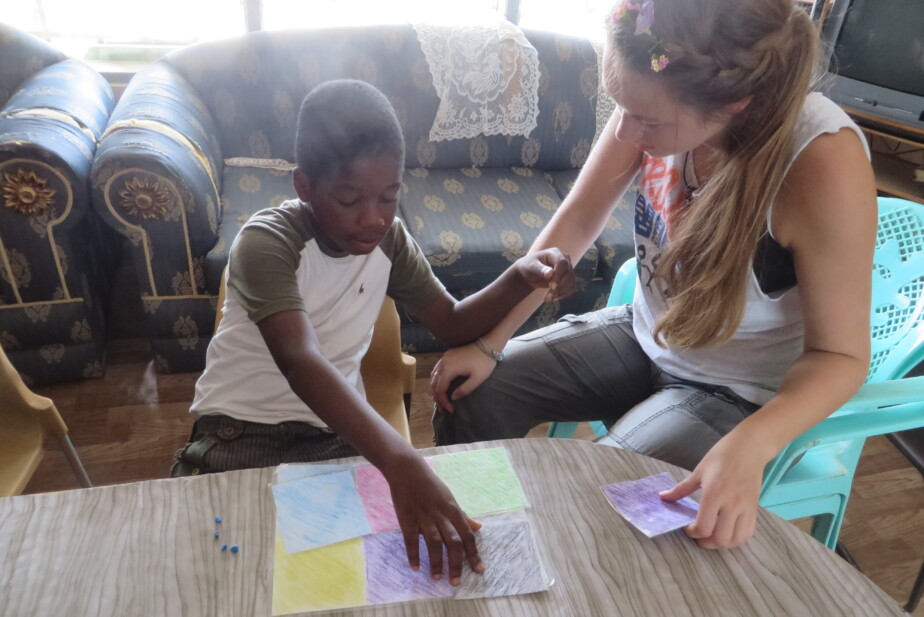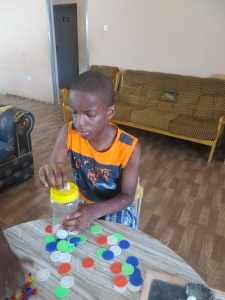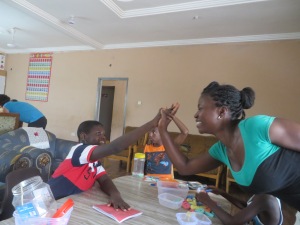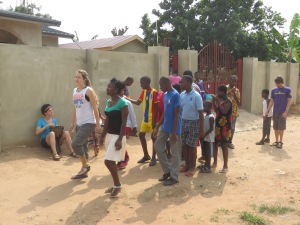
I never thought I would be an aunt to sixteen children, but I am at YAP Ghana. Out of respect, children in Ghana will call adults “Auntie” or “Uncle” for informal situations, otherwise they would use “Madam” or “Sir.” Being an aunt to these children entails more responsibilities than I originally expected, and sometimes more than I want, but it also reassures me that I am more than just their teacher.
Because the volunteers live at the school, our morning begins soon after the children wake up and bathe. After having a bit of (relatively) quiet time to myself in the morning with the revolving fan and my earbuds, I walk out onto the porch to enjoy the morning before the sun reaches a scorching temperature or into the living room to help with breakfast, which is usually served between 8:30 and 9:00. The children demand constant attention and supervision, especially mealtimes.
At 9:30, school officially starts with assembly when the kids line up in two rows and sing “Hello, Hello, What Is Your Name?,” “Good Morning Jesus,” and Ghana’s national anthem, in adddition to going over the day’s date and reciting the Lord’s Prayer. We proceed directly out onto the porch to practice marching for Ghana’s Independence Day Parade on Mondays, Tuesdays, and Thursdays. Half of the kids have come a long way since we began marching, but we have a long way to go before we are ready. As for the other half…they will just smile and wave. Assembly and Marching are quite the sight between the kids screaming the morning songs and attempting to march in a straight line and remember to swing their arms at the same time while others run off in the opposite direction. Needless to say, our morning consists of much laughter.
We then split into our three classes until 13:00, which are divided into three sessions with two fifteen minute breaks. I work with Group 3, the most basic skill level, with Theresa or Inbar. Our students include Shalom, Mimo, Kuku, Joanna, Philip, and Desmond, a new student. Group 2, Appiah, Adwoa, Larwah, and Akua, taught by John Mark, work on colors, counting, the alphabet and letter sounds, matching and sorting. Ema and Inbar teach Group 1, Zadok, Dorothea, Ellorm, Yaw, Kwome, and Dela, the most advanced class, and work on the same skills as Group 2, as well as two-letter words and basic math.
My group presents a challenge, as most cannot talk, and those who can speak gibberish. We work on different skills in our first session, such as following directions, sitting down, standing up, learning body parts, and taking and giving objects. In the second and third session my students work on developing fine motor skills, matching, sorting, and even speaking with the more advanced. Each child is at a different level and needs individual attention, but we manage as best we can with two people.
Shalom, close to eight years old and cute as a button, makes only a “mmmhhh” sound, which reminds me of Dory from Finding Nemo speaking Whale. She usually works on taking items such as foam letters and putting them in one container to the next or putting coins into a container with a slot in the lid, but normally she just enjoys running her hands through the pile of objects; however, she can arrange objects better than any of the other children. Kuku, sweet, sweet Kuku, who makes “blub, blub” sounds when he’s happy, works with the coins, foam letters, and peg boards. He tends to lose focus quickly and to take objects and scratch his head with them. Kuku may not be able to comprehend much, but has zero behavior issues, which makes him one of my favorites.
Joanna, who laughs hysterically, very loudly says “MA!” and other sorts of gibberish, and violently pinches and pushes, though I doubt she understands how much it hurts, also works with the coins and peg board, but she refuses to do anything else even though she is much higher functioning than Kuku. Joanna will sometimes help with Mimo, who works on picking up objects and putting them down. Mimo likes to sing and usually hums “Hello, Hello, What Is Your Name?” and “Good Morning Jesus,” or some other simple tune. Similar to Mimo, Desmond can be found humming a song at a whisper’s volume and occasionally we can hear him say words or phrases. Desmond can sort and match like a pro, but has very little focus and likes to run off in a Shalom-like manner, but unlike Shalom, he doesn’t run right back to his seat. We will have Desmond begin writing soon.
Philip, our most focused student, just began writing, can sort and match and count to five, and usually understands what you ask of him. Over the term he’s progressed from sorting two colors to seven at one time and can now tell the difference between pink and orange and dark and light green. Philip speaks mostly gibberish, but he can say a few words; we attempt to work with him on sounds, but he isn’t shy to throw a tantrum when he would rather not. This bewilders me because he’s always talking and screaming “Aun’ie! Aun’ie! Aun’ie!”; but I think he is just shy and would rather copy Joanna’s “MA!” instead.
Due to my lack of experience in teaching special education, I had almost no expectations coming into this volunteer experience. During my five weeks of teaching I’ve found it difficult to devise new activities and lesson plans because of the lack of focus and behavior issues, but even more so because almost all of the children cannot understand basic concepts such as colors, numbers, sounds, or letters. They may recite the alphabet song perfectly, but if I point to a random letter they cannot tell me what it is. The same problem happens with numbers; I point to a picture with five objects and they say there are two. The same problem happens with colors; I point to a red shirt or blue pants, but everything is yellow. Some understand concepts better than others, but teaching can become very frustrating after working on the same topic for a month or even years without any apparent progress. I may not see any progress throughout the term, but I can only hope that my short time here will leave a beneficial impact and positively reinforce skills they may develop over time.
Desmond matches the colors while I check his work.
Philip working on writing the letter “B.”
Kuku working with the coins.
Theresa and Philip celebrate his good work!
Shalom plays with foam letters while Desmond sorts the different colored blocks.
The “Big 6,” our best marchers, Theresa and I will hold the flag in Ghana’s Independence Parade on March 6th
All the students lined up for marching practice!







